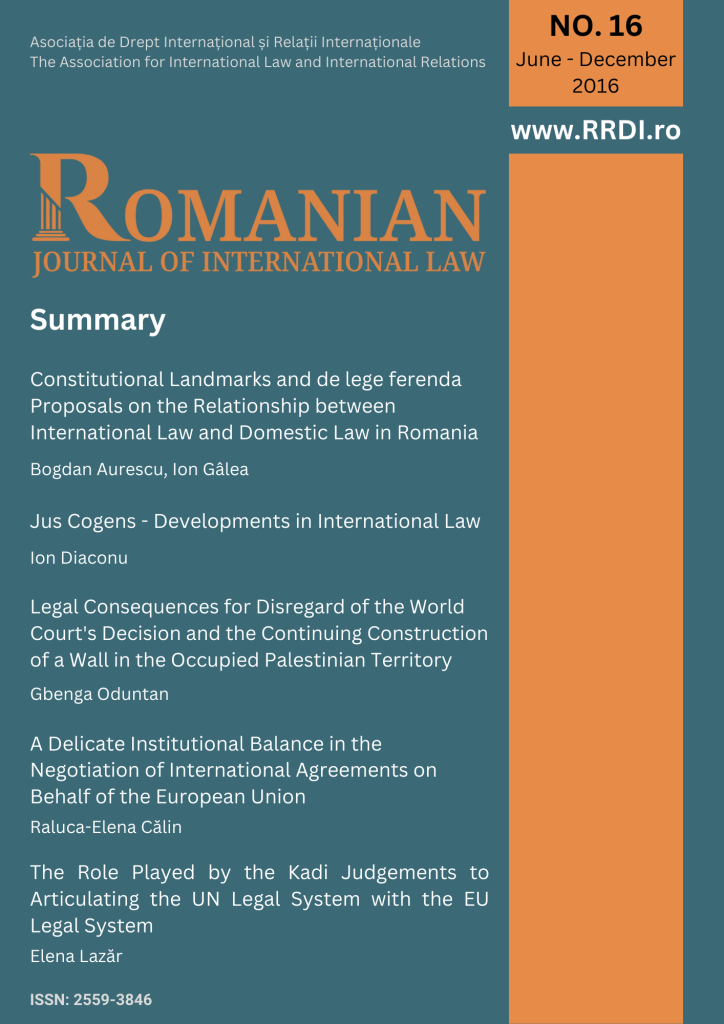International Conference “20 years of Framework Convention for the Protection of National Minorities, 20 years of inter-culturalism, cultural diversity, tolerance, integration” – Cluj-Napoca, 30 April 2015
Gianni BUQUICCHIO
This represents the speech of Mr. Gianni Buquicchio, the president of the Venice Commission, at the International Conference regarding the protection of national minorities, held at Cluj-Napoca, on the 30 of April 2015.
Constitutional Landmarks and de lege ferenda Proposals on the Relationship between International Law and Domestic Law in Romania
Bogdan AURESCU
Ion GÂLEA
An important part of a Constitution is represented by the relationship between international law and domestic law. The relevant provisions of the Constitution of Romania cover the status of international customs and treaties (depending on whether the latter regulate fundamental human rights or not), as well as the powers of the President concerning treaty conclusion. However, these constitutional provisions may require amendments in order to reflect the current trends in State practice, in order to avoid any divergent interpretations and ensuring respect for international law by all State authorities.
JUS COGENS – Developments in International Law
Ion DIACONU
National and international courts, regional and specialized tribunals, all have used in their decisions, at first cautiously and with numerous explanations (related to Public International Law, fundamental rules of general interest or rules creating erga omnes obligations) and subsequently more boldly, the concept of peremptory rules and have come up with examples of such norms. Almost without exception, the doctrine has accepted the existence of peremptory rules (jus cogens) in International Law. The evolution of international practice, especially over the last decade, has led both to the recognition of the existence of peremptory rules and also to the clarification of numerous consequences resulting from the application of this concept in various fields of international law outside the law of treaties. Thus, in this context, the study of the developments in international law with regard to jus cogens norms it is a must.
Legal Consequences for Disregard of the World Court’s Decision and the Continuing Construction of a Wall in the Occupied Palestinian Territory
Gbenga ODUNTAN
A decade after the delivery of the Advisory Opinion of the International Court of Justice (ICJ) in the case Legal Consequences of the Construction of a Wall in the Occupied Palestinian Territory (Request for advisory opinion) popular opinion appears to be that the advisory opinion has not produced any appreciable and positive outcome for and in the interest of the Palestinian people. This article discusses the issues surrounding the legal validity, authoritativeness and bindingness of advisory opinions and notes that although advisory opinions are not judgments but “merely opinions and merely advisory” they do carry a recognisable authority and are generally persuasive and followed by UN member States and even States that are not yet members as exemplified by Israel in relation to the Conditions of Admission of a State to Membership in The United Nations [1948]. 1 The article considers the impact the wall has had over the last 11 years evaluates attempts to give effectiveness to the advisory opinion and makes suggestions as to the future. The article thus, lays the ground for the conclusion that the opinion in the case under discussion ought to be followed by Israel; that Israel bears international responsibility and liability for its action in defiance of the position of international law and particularly for large scale abuse of the rights of individuals and communities in Palestine as a result of the wall policy; and that all UN bodies particularly the Security Council should seek all ways to bring about the implementation of the Courts decision in this case. The reception of the opinion by various key stakeholders are evaluated and the major steps taken by the General Assembly to encourage compliance and to impose liability on the State of Israel are discussed along with suggestions on how to ensure that the legal opinion in this case is finally used as a basis to bring down the much criticised and illegal, approximately 700 km structure, which is a clog in the wheel of the general resolution of the problems surrounding the occupation of Palestinian territories and the law and politics of the Israeli-Palestinian issue in international relations.
The Joint Comprehensive Plan of Action as endorsed by United Nations Security Council Resolution 2231/2015- a presentation
Radu Mihai ŞERBĂNESCU
The conclusion of the Joint Comprehensive Plan of Action saw the end of multilateral negotiations that brought together actors of almost the entire international community having some of the most diverging interests in a field that arguably lies at the core of international peace and security: nuclear activity. This article will first analyze the background for the adoption of the agreement, then analyze its provisions and consequence and finally highlight a number of uncertainties that are left on the Iranian nuclear activity and the international sanctions adopted in this regard.
Ukraine and the International Criminal Court: the second declaration of acceptance and why it is worth the comparison to the situation in Georgia
Simona Gabriela VOICULESCU
Now that the first step towards bringing to justice those responsible in the conflict in Georgia has been made, it is fairly normal to put some hope into the fact that, following the second declaration of accepting the ICC’s jurisdiction, the situation in Ukraine will fall into the same steps, although probably much later. Without bringing too much attention to the facts, since they are not unfamiliar, the focus of the article will be brought to picturing the course of events following Ukraine’s second declaration, from the ICC Prosecutor’s point of view. The choice of comparison to Georgia is not random in the slightest: from the historical background to the evolution of events, the Russian Federation’s implication and scopes, to the procedure that has to be followed by the Prosecutor in order for the alleged crimes to be brought to justice.

